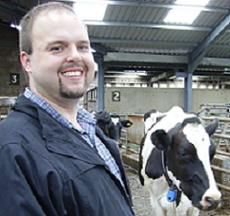UK professor resigns after sexual misconduct allegations brought against him

Jeffrey Bewley, who had been a dairy professor in the UK College of Agriculture since 2007, recently resigned amid an investigation into his alleged inappropriate relations with students.
November 21, 2017
A UK agriculture professor resigned on Nov. 8 amid an ongoing investigation into inappropriate relationships he allegedly had with two students.
Jeffrey Bewley was hired as an extension faculty member in dairy systems in 2007. An investigation began on Nov. 2, 2017 after a complaint was filed, according to documents and emails obtained via an open records request submitted by the Kernel.
On Nov. 2, UK’s interim Title IX Director Martha L. Alexander notified Jeffrey Bewley that the Office of Institutional Equity and Equal Opportunity had received notice that Bewley “may have violated the University’s policies relating to discrimination, harassment or sexual misconduct,” her email read.
The individual who reported him said that she and Bewley engaged in a sexual relationship, which was not reported to the chair of Bewley’s department or the dean of the college, according to Alexander’s email. Furthermore, the reporting individual said Bewley continued contacting her after he had been asked to stop.
Alexander and Bewley met on the afternoon of Nov. 2. During the meeting, Bewley admitted to the relationship with the reporting student, as well as a prior sexual relationship with a different student, which was also not appropriately reported.
“As you are aware, being in a personal relationship with someone whose work you evaluate without disclosure of that relationship to the Chair or Dean constitutes a violation of Governing Regulation XIV (B)(6),” Alexander wrote in an email to Bewley.
Shortly after the meeting, Bewley notified Alexander, Department of Animal and Food Sciences Chair Richard Coffey and College of Agriculture Dean Nancy Cox that he was resigning, effective immediately.
Bewley wrote to Alexander that his resignation would be in the best interest of everyone involved.
“Although I don’t agree with all of the allegations and I did not indicate any conditions, then I need to let her move on personally and professionally without impeding her progress or life,” Bewley wrote.
He wrote that he would like to minimize additional stress on the student, the UK administration, and “those who will be negatively impacted by my departure.”
“This is a sad, difficult day for me,” he wrote in his resignation letter to Coffey.
Because he resigned and is no longer a UK employee, the investigation has been suspended. Alexander notified him that the investigation would be reopened should he return to UK in any capacity.
According to Bewley’s employee separation sheet, he voluntarily quit without notice and will not be eligible for rehire.
In an email to Alexander, Bewley questioned what he can and can’t say when applying for future jobs.
UK spokesperson Jay Blanton said that if another university contacts UK about Bewley, UK will confirm his employment and that he resigned.
“Further, we will say that at the time of his resignation there was an ongoing investigation regarding the potential violation of our policies relative to sexual misconduct,” Blanton said.
Blanton said it is important to note that the investigation ceased because of his resignation, and that UK no longer has any authority to discipline him or compel him to testify or provide information.
“It’s also important to note the timeline here: Shortly after he was informed about the complaint—and admitted that he had not told his supervisor about a student in violation of university policy—he resigned,” Blanton said.
Blanton said UK takes allegations like this very seriously and thoroughly investigates them.
“We believe strongly that this must be a community where everyone feels a sense of safety and belonging,” he said. “Our commitment to investigating allegations of wrongdoing when they happen is a critical part of creating that kind of community.”
Blanton said it is also important to the university that both the person bringing the complaint and the accused person receive the rights of due process in these situations.
No information that could potentially identify the reporting student can be provided because of federal privacy laws.






















































































































































